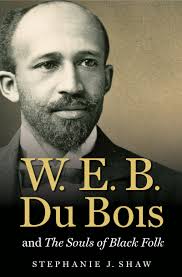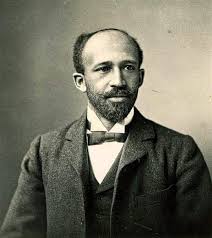The Souls of Black Folk Page #17
The Souls of Black Folk is a 1903 work of American literature by W. E. B. Du Bois. It is a seminal work in the history of sociology and a cornerstone of African-American literature. The book contains several essays on race, some of which the magazine Atlantic Monthly had previously published.
My journey was done, and behind me lay hill and dale, and Life and Death. How shall man measure Progress there where the dark-faced Josie lies? How many heartfuls of sorrow shall balance a bushel of wheat? How hard a thing is life to the lowly, and yet how human and real! And all this life and love and strife and failure,—is it the twilight of nightfall or the flush of some faint-dawning day? Thus sadly musing, I rode to Nashville in the Jim Crow car. V. Of the Wings of Atalanta O black boy of Atlanta! But half was spoken; The slave’s chains and the master’s Alike are broken; The one curse of the races Held both in tether; They are rising—all are rising— The black and white together. WHITTIER. South of the North, yet north of the South, lies the City of a Hundred Hills, peering out from the shadows of the past into the promise of the future. I have seen her in the morning, when the first flush of day had half-roused her; she lay gray and still on the crimson soil of Georgia; then the blue smoke began to curl from her chimneys, the tinkle of bell and scream of whistle broke the silence, the rattle and roar of busy life slowly gathered and swelled, until the seething whirl of the city seemed a strange thing in a sleepy land. Once, they say, even Atlanta slept dull and drowsy at the foot-hills of the Alleghanies, until the iron baptism of war awakened her with its sullen waters, aroused and maddened her, and left her listening to the sea. And the sea cried to the hills and the hills answered the sea, till the city rose like a widow and cast away her weeds, and toiled for her daily bread; toiled steadily, toiled cunningly,—perhaps with some bitterness, with a touch, of réclame,—and yet with real earnestness, and real sweat. It is a hard thing to live haunted by the ghost of an untrue dream; to see the wide vision of empire fade into real ashes and dirt; to feel the pang of the conquered, and yet know that with all the Bad that fell on one black day, something was vanquished that deserved to live, something killed that in justice had not dared to die; to know that with the Right that triumphed, triumphed something of Wrong, something sordid and mean, something less than the broadest and best. All this is bitter hard; and many a man and city and people have found in it excuse for sulking, and brooding, and listless waiting. Such are not men of the sturdier make; they of Atlanta turned resolutely toward the future; and that future held aloft vistas of purple and gold:—Atlanta, Queen of the cotton kingdom; Atlanta, Gateway to the Land of the Sun; Atlanta, the new Lachesis, spinner of web and woof for the world. So the city crowned her hundred hills with factories, and stored her shops with cunning handiwork, and stretched long iron ways to greet the busy Mercury in his coming. And the Nation talked of her striving. Perhaps Atlanta was not christened for the winged maiden of dull Boeotia; you know the tale,—how swarthy Atalanta, tall and wild, would marry only him who out-raced her; and how the wily Hippomenes laid three apples of gold in the way. She fled like a shadow, paused, startled over the first apple, but even as he stretched his hand, fled again; hovered over the second, then, slipping from his hot grasp, flew over river, vale, and hill; but as she lingered over the third, his arms fell round her, and looking on each other, the blazing passion of their love profaned the sanctuary of Love, and they were cursed. If Atlanta be not named for Atalanta, she ought to have been. Atalanta is not the first or the last maiden whom greed of gold has led to defile the temple of Love; and not maids alone, but men in the race of life, sink from the high and generous ideals of youth to the gambler’s code of the Bourse; and in all our Nation’s striving is not the Gospel of Work befouled by the Gospel of Pay? So common is this that one-half think it normal; so unquestioned, that we almost fear to question if the end of racing is not gold, if the aim of man is not rightly to be rich. And if this is the fault of America, how dire a danger lies before a new land and a new city, lest Atlanta, stooping for mere gold, shall find that gold accursed! It was no maiden’s idle whim that started this hard racing; a fearful wilderness lay about the feet of that city after the War,—feudalism, poverty, the rise of the Third Estate, serfdom, the re-birth of Law and Order, and above and between all, the Veil of Race. How heavy a journey for weary feet! what wings must Atalanta have to flit over all this hollow and hill, through sour wood and sullen water, and by the red waste of sun-baked clay! How fleet must Atalanta be if she will not be tempted by gold to profane the Sanctuary! The Sanctuary of our fathers has, to be sure, few Gods,—some sneer, “all too few.” There is the thrifty Mercury of New England, Pluto of the North, and Ceres of the West; and there, too, is the half-forgotten Apollo of the South, under whose aegis the maiden ran,—and as she ran she forgot him, even as there in Boeotia Venus was forgot. She forgot the old ideal of the Southern gentleman,—that new-world heir of the grace and courtliness of patrician, knight, and noble; forgot his honor with his foibles, his kindliness with his carelessness, and stooped to apples of gold,—to men busier and sharper, thriftier and more unscrupulous. Golden apples are beautiful—I remember the lawless days of boyhood, when orchards in crimson and gold tempted me over fence and field—and, too, the merchant who has dethroned the planter is no despicable parvenu. Work and wealth are the mighty levers to lift this old new land; thrift and toil and saving are the highways to new hopes and new possibilities; and yet the warning is needed lest the wily Hippomenes tempt Atalanta to thinking that golden apples are the goal of racing, and not mere incidents by the way.
Translation
Translate and read this book in other languages:
Select another language:
- - Select -
- 简体中文 (Chinese - Simplified)
- 繁體中文 (Chinese - Traditional)
- Español (Spanish)
- Esperanto (Esperanto)
- 日本語 (Japanese)
- Português (Portuguese)
- Deutsch (German)
- العربية (Arabic)
- Français (French)
- Русский (Russian)
- ಕನ್ನಡ (Kannada)
- 한국어 (Korean)
- עברית (Hebrew)
- Gaeilge (Irish)
- Українська (Ukrainian)
- اردو (Urdu)
- Magyar (Hungarian)
- मानक हिन्दी (Hindi)
- Indonesia (Indonesian)
- Italiano (Italian)
- தமிழ் (Tamil)
- Türkçe (Turkish)
- తెలుగు (Telugu)
- ภาษาไทย (Thai)
- Tiếng Việt (Vietnamese)
- Čeština (Czech)
- Polski (Polish)
- Bahasa Indonesia (Indonesian)
- Românește (Romanian)
- Nederlands (Dutch)
- Ελληνικά (Greek)
- Latinum (Latin)
- Svenska (Swedish)
- Dansk (Danish)
- Suomi (Finnish)
- فارسی (Persian)
- ייִדיש (Yiddish)
- հայերեն (Armenian)
- Norsk (Norwegian)
- English (English)
Citation
Use the citation below to add this book to your bibliography:
Style:MLAChicagoAPA
"The Souls of Black Folk Books." Literature.com. STANDS4 LLC, 2025. Web. 24 Feb. 2025. <https://www.literature.com/book/the_souls_of_black_folk_310>.








Discuss this The Souls of Black Folk book with the community:
Report Comment
We're doing our best to make sure our content is useful, accurate and safe.
If by any chance you spot an inappropriate comment while navigating through our website please use this form to let us know, and we'll take care of it shortly.
Attachment
You need to be logged in to favorite.
Log In